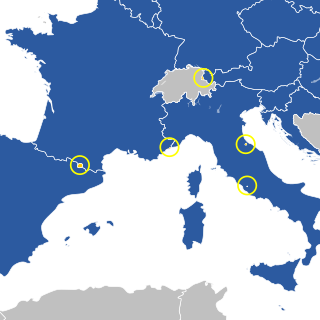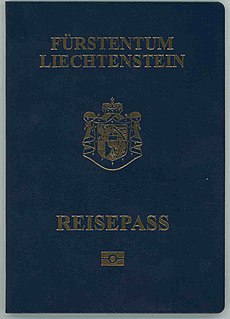
The European Free Trade Association (EFTA) is a regional trade organization and free trade area consisting of four European states: Iceland, Liechtenstein, Norway, and Switzerland. The organization operates in parallel with the European Union (EU), and all four member states participate in the European Single Market and are part of the Schengen Area. They are not, however, party to the European Union Customs Union.
The following table lists the independent European states, and their memberships in selected organisations and treaties.

The Court of Justice of the European Free Trade Association States is a supranational judicial body responsible for the three EFTA members who are also members of the European Economic Area (EEA): Iceland, Liechtenstein and Norway.

A customs union is the principal area of robust formal agreement between the Principality of Andorra and the European Union (EU). Andorra borders two EU member states: France and Spain.
The freedom of movement for workers is a policy chapter of the acquis communautaire of the European Union. The free movement of workers means that nationals of any member state of the European Union can take up an employment in another member state on the same conditions as the nationals of that particular member state. In particular, no discrimination based on nationality is allowed. It is part of the free movement of persons and one of the four economic freedoms: free movement of goods, services, labour and capital. Article 45 TFEU states that:
- Freedom of movement for workers shall be secured within the Community.
- Such freedom of movement shall entail the abolition of any discrimination based on nationality between workers of the Member States as regards employment, remuneration and other conditions of work and employment.
- It shall entail the right, subject to limitations justified on grounds of public policy, public security or public health:
- The provisions of this article shall not apply to employment in the public service.

The most recent enlargement of the European Union saw Croatia become the European Union's 28th member state on 1 July 2013. The country applied for EU membership in 2003, and the European Commission recommended making it an official candidate in early 2004. Candidate country status was granted to Croatia by the European Council in mid-2004. The entry negotiations, while originally set for March 2005, began in October that year together with the screening process.

The visa policy of the Schengen Area is set by the European Union and applies to the Schengen Area and to other EU member states except Ireland. The visa policy allows nationals of certain countries to enter the Schengen Area via air, land or sea without a visa for stays of up to 90 days within a 180-day period. Nationals of certain other countries are required to have a visa either upon arrival or in transit.

There are a number of microstates in Europe. While there is no clear consensus on which political units qualify as "microstates", most scholars view Andorra, Liechtenstein, Monaco, San Marino and the Vatican City as examples of such states. At the same time, some academics dispute even qualifying Vatican as a true state arguing that it does not meet the "traditional criteria of statehood" and that the "special status of the Vatican City is probably best regarded as a means of ensuring that the Pope can freely exercise his spiritual functions, and in this respect is loosely analogous to that of the headquarters of international organisations." According to the qualitative definition of microstates suggested by Dumienski (2014), microstates can also be viewed as "modern protected states, i.e. sovereign states that have been able to unilaterally depute certain attributes of sovereignty to larger powers in exchange for benign protection of their political and economic viability against their geographic or demographic constraints." And indeed, all of the European microstates are sovereign states that function in a close association with their respective larger neighbour. Currently, all of the European microstates have some form of relations with the European Union (EU).

The Citizens’ Rights Directive 2004/38/EC defines the right of free movement for citizens of the European Economic Area (EEA), which includes the member states of the European Union (EU) and the three European Free Trade Association (EFTA) members Iceland, Norway and Liechtenstein. Switzerland, which is a member of EFTA but not of the EEA, is not bound by the Directive but rather has a separate bilateral agreement on free movement with the EU.

A Norwegian passport is the passport issued to nationals of Norway for the purpose of international travel. Beside serving as proof of Norwegian citizenship, they facilitate the process of securing assistance from Norwegian consular officials abroad.

Liechtenstein passports are issued to nationals of Liechtenstein for the purpose of international travel. Beside serving as proof of Liechtenstein citizenship, they facilitate the process of securing assistance from Liechtenstein consular officials abroad.

The European Union itself does not issue ordinary passports, but ordinary passport booklets issued by its 27 member states share a common format. This common format features a coloured cover emblazoned—in the official language(s) of the issuing country —with the title "European Union", followed by the name(s) of the member state, the heraldic "Arms" of the State concerned, the word "PASSPORT", together with the biometric passport symbol at the bottom centre of the front cover.

Icelandic passports are issued to citizens of Iceland for the purpose of international travel. Beside serving as proof of Icelandic citizenship, they facilitate the process of securing assistance from Icelandic consular officials abroad.
1 These countries are currently not participating in the EU's single market (EEA), but the EU has common external Customs Union agreements with Turkey, Andorra and San Marino. Monaco participates in the EU customs union through its relationship with France; its ports are administered by the French. Vatican City has a customs union in effect with Italy.
2 Monaco, San Marino and Vatican City are not members of Schengen, but act as such via their open borders with France and Italy, respectively.
3 Switzerland is not an official member of EEA but has bilateral agreements largely with same content, making it virtual member.

The Schengen Area is an area comprising 26 European countries that have officially abolished all passport and all other types of border control at their mutual borders. The area mostly functions as a single jurisdiction for international travel purposes, with a common visa policy. The area is named after the 1985 Schengen Agreement signed in Schengen, Luxembourg.
The Swiss identity card in its current form dates back to July 1994. It is in the form of a plastic photocard. It can be used as a travel document when travelling within EFTA or to the EU, as well as the UK until 1 October 2021, the European microstates, the Channel Islands, Greenland, Turkey, and on organized tours to Tunisia.

The visa policy of Ireland is set by the Government of Ireland and determines visa requirements for foreign citizens. If someone other than a European Union, European Economic Area, Common Travel Area or Swiss citizen seeks entry to Ireland, they must be a national of a visa-exempt country or have a valid Irish visa issued by one of the Irish diplomatic missions around the world.

The Norwegian identity card, commonly referred to as the national identity card in Norway, is a non-compulsory biometric identity document issued since 30 November 2020. It is one of two official identity documents issued by the Norwegian Police Service, the other being the Norwegian passport. It is only issued to Norwegian citizens, and may indicate citizenship so that it can be used as a travel document facilitating freedom of movement in EFTA and the European Economic Area. For travel within the Nordic countries no identity documentation is legally required for Nordic citizens due to the Nordic Passport Union.

Passports of the EFTA member states are passports issued by the European Free Trade Association (EFTA) member states Iceland, Liechtenstein, Norway and Switzerland. EFTA is in this article used as a common name for these countries.

Passports in Europe are issued by each state individually, e.g. the Netherlands or UK. In general, passports issued in Europe either grant the holder the right of freedom of movement within the European Economic Area, to those that don't. The majority of European states are members of the European Union, and therefore issue EU passports.













